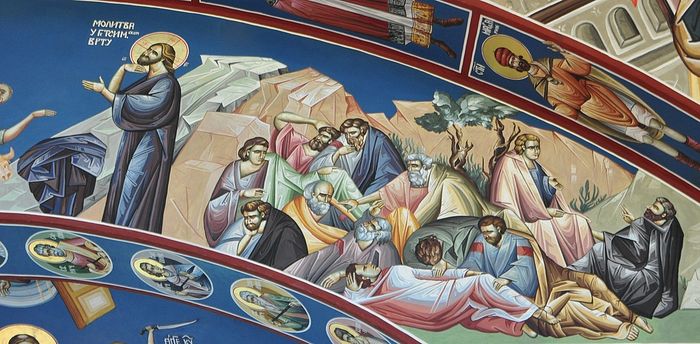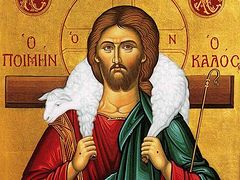The Lord Jesus said: “‘He who has my commandments and keeps them, he it is who loves me; and he who loves me will be loved by my Father, and I will love him and manifest myself to him.’
Judas (not Iscariot) said to him, ‘Lord, how is it that you will manifest yourself to us, and not to the world?'” (John 14:21-22)
St Gregory of Nyssa (d. ca 384AD) offers an answer to the Apostle Judas‘ question as to how it is that God’s manifestation may be seen only by some when “objectively” the event should be visible to everyone.
“…True doctrine conforms to the dispositions of those receiving the word, for although the word presents to all equally what is good and bad, the one who is favorably disposed to what is presented has his understanding enlightened, but the darkness of ignorance remains with the one who is obstinately disposed and does not permit his soul to behold the ray of truth….
In keeping with this insight of mine, consider the air which is darkened to the Egyptians’ eyes by the rod [Exodus 10:21-29], while to the Hebrews’ it is illuminated by the sun. By this incident the meaning which we have given is confirmed. It was not some constraining power from above that caused the one to be found in darkness and the other in light, but we men have in ourselves, in our own nature and by our own choice, the causes of light or of darkness, since we place ourselves in whichever sphere we wish to be.
According to the history, the eyes of the Egyptians were not in darkness because some wall or mountain darkened their view and shadowed the rays, but the sun cast its rays upon all equally. Whereas the Hebrews delighted in its light, the Egyptians were insensitive to its gift. In a similar manner the enlightened life is proposed to all equally according to their ability. Some continue on in darkness, driven by their evil pursuits to the darkness of wickedness. while others are made radiant by the light of virtue.” (The Life of Moses, p. 69, 72-73)
St Gregory’s answer is based in a clear idea of synergy – God’s revelation, God’s manifestation requires also observers who prepared/open to receive what God reveals. This idea is reflected in quantum physics where the observer affects the outcome of what is being observed. God does not even impose His revelation on humanity. Our inner disposition toward God will determine what we experience of God in our life. Almost 200 years before Gregory of Nyssa’s writing, St Irenaeus of Lyons (d. 202AD) offered a very similar idea:
“In respect to His greatness, and His wonderful glory, no man shall see God and live (Exodus 33:20), for the Father is incomprehensible; but in regard to His love, and kindness, and as to His infinite power, even this He grants to those who love Him, that is, to see God, which thing the prophets did also predict. For those things that are impossible with men, are possible with God (Luke 18:27). For man does not see God by his own powers; but when He pleases He is seen by men, by whom He wills, and when He wills, and as He wills. For God is powerful in all things, having been seen at that time indeed, prophetically through the Spirit, and seen, too, adoptively through the Son; and He shall also be seen paternally in the kingdom of heaven, the Spirit truly preparing man in the Son of God, and the Son leading him to the Father, while the Father, too, confers [upon him] incorruption for eternal life, which comes to everyone from the fact of his seeing God.
For as those who see the light are within the light, and partake of its brilliancy; even so, those who see God are in God, and receive of His splendor. But [His] splendor vivifies them; those, therefore, who see God, do receive life. And for this reason, He, [although] beyond comprehension, and boundless and invisible, rendered Himself visible, and comprehensible, and within the capacity of those who believe, that He might vivify those who receive and behold Him through faith. For as His greatness is past finding out, so also His goodness is beyond expression; by which having been seen, He bestows life upon those who see Him. It is not possible to live apart from life, and the means of life is found in fellowship with God; but fellowship with God is to know God, and to enjoy His goodness.” (ADV. HAERESES4.20.5)
And this is eternal life, that they know You the only true God, and Jesus Christ whom You have sent. (John 17:3)




